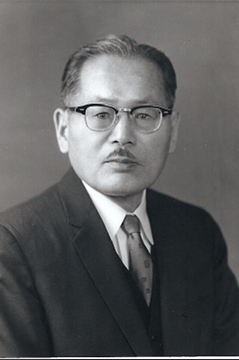
Thomas K. Takeshita
Camp Name:
Heart Mountain
Block Number:
12
Barracks Number:
10-D
Location during WWII, if not in a camp:
Washington, D.C.
Thomas Kohachiro
Yamamoto (muko-yoshi) Takeshita
Thomas Kohachiro Takeshita left us a legacy of accomplishments and memories that enriched not only his own life but also of others. He was born Kohachiro Yamamoto, April 20, 1891, in Tanami-mura, Wakayama, Japan, it was many years later in America that he acquired the name Thomas Kohachiro Takeshita. In 1907 when he was 16, he and his older brother Kijuro (21), joined a group of Japanese migrant labors to work in the grueling coal mines of Mexico. Several months later in revolt against these oppressive work conditions, they escaped to America. They finally made their way to Los Angeles, California.
Kohachiro quickly realized the need to learn English and acquire an education. In 1911, while working as a houseboy he attended high school during the day, finally graduating in 1915. He continued his financial struggle through college, ultimately graduating from the University of Utah in 1921 with a Bachelor Degree in Chemistry.
During college he adopted the American name, Thomas. In Salt Lake City (1923), he married Katsuyo Lily Takeshita in the Japanese custom of muko-yoshi, where upon he became Thomas K. Takeshita. The Utah economy was in a slump. With their baby daughter Lyn, they moved to Los Angeles, California for greater employment opportunities. In Los Angeles, Thomas worked as a chemist until the depression closed that business. He then worked for the Japanese Dry Cleaners Association, translating from English into Japanese the many rules and regulations of the trade directed especially toward “Oriental” owners. This led Thomas and Katsuyo into starting their own dry cleaning business, which continued to grow in size.
In 1937, they opened one of the first modern-equipped dry cleaning plants that began to flourish. At the same time, Thomas invented several dry cleaning products including a sleeve-form that improved and eased the pressing of coat sleeves. He independently manufactured these inventions and self-marketed them in California, with much success. However, the onset of World War II and E.O. 9066 caused Thomas’s businesses to terminate at a tremendous financial loss.
The evacuation took Thomas, Katsuyo, and their two daughters, Lyn and Joy, to Heart Mountain, Wyoming. With determination to rise above the feelings of defeat, Thomas joined the staff of the Heart Mountain Sentinel to write articles for the Japanese section of the newspaper. He found pleasure in teaching classes in shigin, Japanese classical singing. He was also active in the Christian church there.
In August 1943, leaving Heart Mountain, he, his wife, and daughter Joy relocated to Salt Lake City, Utah. There, Thomas and Katsuyo successfully applied for Federal Government jobs, which led them to Washington, D.C. in late 1943. In the Nation’s Capital they worked for the Foreign Broadcasting Intelligence Service translating intercepted documents from Japan. For the WRA he wrote articles on the Issei as they relocated from camp. But his most important job was with the Anti-Discrimination and Naturalization Committee under Mike Masaoka that led to the enactment of the Senate Walter/McCarran Bill, enabling the rights to naturalization regardless of race in 1952. For the benefit of the Issei, Thomas translated into Japanese the history, the process and procedure that finally allowed them to apply for U.S. citizenship.
Thomas achieved his ultimate goal of writing a book in Japanese called, Yamato Damashii Under the Star and Stripes, in collaboration with Dr. Kaname Saruya. It documents the history of the Issei’s fight for American citizenship and civil rights, culminating in gaining equal rights and privileges to those of Japanese ancestry. The book met with success in Japan, and helped create a bridge of understanding between the Japanese of America and Japan. Despite the injustice of E.O. 9066, Thomas triumphed over the trauma of evacuation and incarceration and lived a life that deserves to be honored.